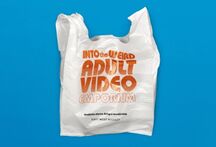为了劝人们少用塑料袋 这位杂货店主给塑料袋印上尴尬字眼
为了减少白色污染,现在多数商店都对塑料袋收费,虽然人们嫌塑料袋太贵,但还是懒得自备环保袋。于是,加拿大温哥华一家杂货店的店主想出了一个奇招:给塑料袋印上让人尴尬的文字,结果如何呢?
If concern over the climate crisis or revulsion over the contamination of the food chain are not enough to change consumer behavior, one grocery store is hoping that another emotion may persuade people to shun single-use plastic bags: shame.
如果对气候危机的担忧或对食物链污染的厌恶还不足以改变消费者行为,一家杂货店希望另一种情感可以说服人们避免使用一次性塑料袋——羞耻感。

Customers who don’t bring their own bags to the East West Market in Vancouver will instead have to carry their grocery home in bags reading “Wart Ointment Wholesale” or “Into the Weird Adult Video Emporium”.
在温哥华的东西商店,如果顾客不自己带包来装东西,就必须用印有“去疣药膏批发”或“诡异成人视频商店”等文字的塑料袋将食品杂货装回家。
David Lee Kwen, the shop’s owner, insisted that the plan wasn’t to embarrass customers. “We wanted to give them something humorous, but also something that made them think at the same time,” he told the Guardian. “It’s human nature not to want to be told what to do.”
这家杂货店的店主戴维·李·克文坚称,这一计划不是为了让顾客尴尬。他告诉《卫报》说:“我们想用一种幽默的方式让顾客思考。不喜欢听人说教是人的本性。”
Kwen initially hoped that a fee on single-use bags would discourage their use. But when the five-cent a bag charge failed to stop people using plastic, he tried a different approach.
克文最初希望对一次性袋子收费可以阻止顾客使用。然而,当5分/只的收费没能奏效后,他尝试了一个不同的方法。
The bags are meant to force customers to think twice about consumption habits. In a social media post, the store points out that millions of plastic bags are used once before being discarded – and are part of growing problem of plastic waste.
这些袋子是为了迫使顾客好好思考一下自己的消费习惯。在社交媒体上的一个帖子里,这家商店指出,数百万的塑料袋都是只用了一次就被丢弃,助长了日益严重的塑料垃圾问题。
Like countries around the world, Canada is grappling with a deluge of plastics which cannot be recycled and instead end up in landfills.
和世界各国一样,加拿大也在努力应对泛滥成灾的无法回收塑料垃圾,这些塑料最后只能被送去垃圾填埋场。
Earlier this week, Canada’s prime minister, Justin Trudeau, announced plans to ban single-use plastics in 2021, including grocery bags, plastic cutlery and straws.
本周早些时候,加拿大总理贾斯廷·特鲁多宣布将从2021年开始禁用一次性塑料制品,包括购物袋、塑料餐具和吸管。
cutlery['kʌtləri]: n. 餐具
Kwen admits there may have been an unintended consequence to the bags: “Some of the customers want to collect them because they love the idea of it,” he said. But he still believes the plan is working. “Even if you have the bag, you have to explain its origin to your friends. And then, we’ve started a conversation.”
克文承认,也许会出现意想不到的结果,他说:“一些顾客想收集这些袋子,因为他们喜欢这个创意。”但他仍然认为这个计划是有效的。“即使你拿了这个袋子,你也要向朋友解释它是从哪来的。然后,对话就开始了。”
The bags, which Kwen has run in limited numbers of 1,000, cost customers five cents. It costs extra for him to print the newly designed bags so he’s hopeful customers instead opt to bring in their own.
这些袋子限量1000只,单价5分钱。克文还额外花钱来印刷新设计的袋子,希望顾客能因此选择自备袋子。
In the meantime, he plans to transfer the images on the plastic bags to canvas bags. “We wanted to address an issue, but we’ve also made something popular, so it’s turned out great.”
与此同时,他计划把塑料袋上的图样转移到帆布袋上。“我们想解决一个问题,但我们也做出了一些受欢迎的东西,所以结果还不错。”